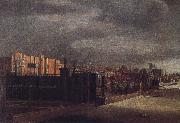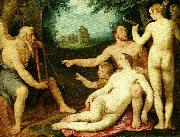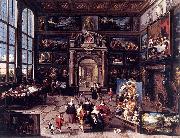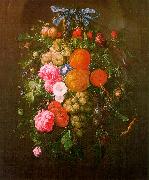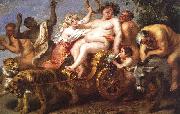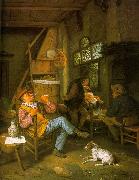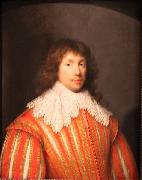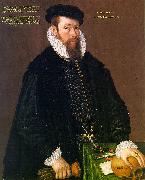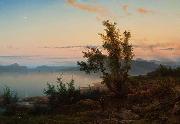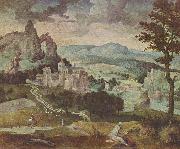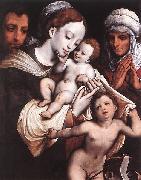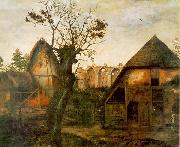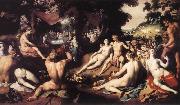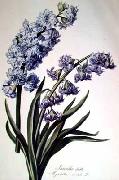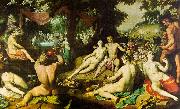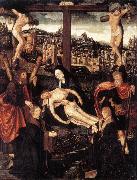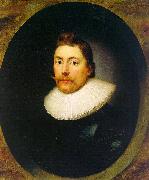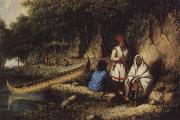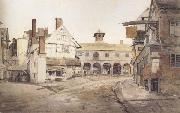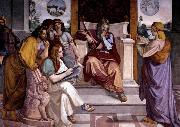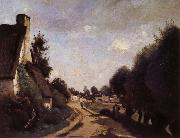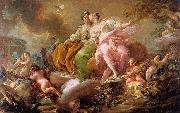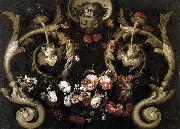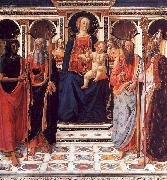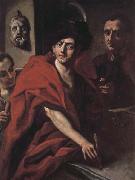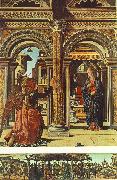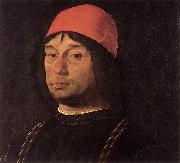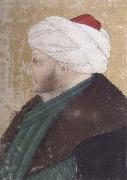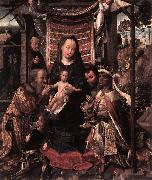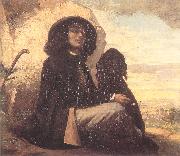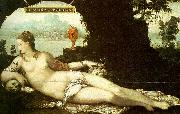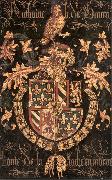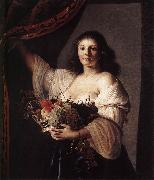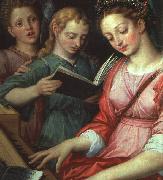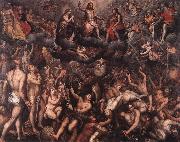|
|
|
|
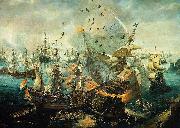 |
Cornelis Claesz. van Wieringen
|
|
He was the son of a Haarlem captain, and drew, painted and etched with his friends Hendrick Goltzius and Cornelis van Haarlem. He also held important positions in the Haarlem Guild of St. Luke, the painters guild, where he became a member in 1597.
He specialized in paintings depicting ships and sea battles, and received orders from the municipal councils of Haarlem and Amsterdam. He painted the most popular picture of the Damiate legend of Haarlem, showing how a Haarlem ship broke the protective chain at Damietta during the Fifth Crusade, resulting in an important victory over Islam. This painting was such a success that it was reordered in tapestry form, and both pieces are in the collection of the Frans Hals Museum.
The city of Haarlem archives still hold the original records of the 1629 order to Van Wieringen to make the tapestry, the largest made in the 17th century (10.75 meters long and 2.40 meters high). This tapestry still hangs on the wall of the Haarlem City Hall council meeting room known as the vroedschapskamer, where it was installed. It is on public display once a year on Monument Day.
|
|
|
|
|
|
|
|
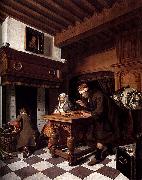 |
Cornelis de Man
|
|
(Delft, 1 July 1621 - Delft, 1 September 1706) was a Dutch Golden Age painter.
Kornelis was not satisfied with life in Delft. He wanted to travel beyond the port of Dordrecht and that is what he did, spending a year in Paris as soon as he came of age and had enough talent to pay his way with his painting skills. He was well-received, but set off in the Spring for Lyon in order to cross Lombardia and the mountains before another winter set in. He settled for two years in Florence, where he had a rich patron, but stayed the longest in Rome. On the way back home he stopped in Venice, and in the end was gone for a total of nine years |
|
|
|
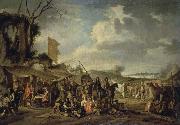 |
Cornelis de Wael
|
|
Cornelis de Wael (1592-1667) was a Flemish painter of the Baroque period, active mainly in Italy, specifically Genoa. He was born in Antwerp, the son of a painter, and died in Rome.
|
|
|
|
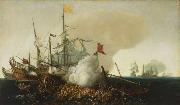 |
Cornelis Hendriksz Vroom
|
|
(1591, Haarlem - buried September 16, 1661, Haarlem) was a Dutch Golden Age landscape painter.
According to the RKD he was the son of the painter Hendrick Cornelisz Vroom, the older brother of Frederick and Jacob, and the father of the painter Jacob Cornelisz Vroom.[1] He became a member of the Haarlem Guild of St. Luke in 1634.
According to Houbraken in 1718, who repeated a list of names from Theodorus Schrevelius's 1648 book on Haarlem called Harlemias, he was the son of Hendrick Cornelisz Vroom and a good landscape painter of Haarlem along with "Joh. Jakobsz.", who was in Italy for many years, "Nicol. Zuyker", Gerrit Claesz Bleker, Salomon van Ruysdael, and Reyer van Blommendael. |
|
 |
Cornelis Holsteyn
|
|
(1618 - 2 December 1658) was a Dutch Golden Age painter from Haarlem.
According to the RKD he was a painter of historical allegories, portraits, and interior decorations, trained by his father Pieter Holsteyn I. According to Houbraken, his father was a glass painter, and thus was trained for glass painting, but the market in glass painting not being what it was, he turned his hand to painting canvas. Houbraken felt he received less for a painting than he deserved, because his work was of a very high quality. He describes a Triumph of Bacchus, and a Lycurgus, which was painted for the Amsterdam Orphanage.
According to the RKD, he moved to Amsterdam with his brother Pieter Holsteyn II in 1647, became poorter there in 1652, and was betrothed there on Christmas eve, 1654. He was buried in the Nieuwe Kerk on December 2, 1658 from his home on the Rozengracht. Houbraken claimed he had been fit until his sudden death by Hartvang, or heart-attack.
|
|
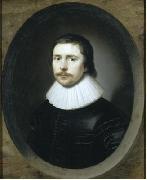 |
Cornelis Janssens van Ceulen
|
|
(also Cornelius Jonson van Ceulen, Cornelius Johnson, Cornelis Jansz. van Ceulen and many other variants)(bapt. October 14, 1593, London - bur. August 5, 1661, Utrecht) was an English painter of portraits of Dutch or Flemish parentage. He has been described as "one of the most gifted and prolific portrait painters practising in England during the 1620s and 1630s".
Janssens van Ceulen was born to Dutch or Flemish parents in London - his father had been a refugee from Antwerp, and the family had originated in Cologne. He was baptised at the Dutch church at Austin Friars, the son of Johanna le Grand and Cornelius Johnson. He may have been trained in the Netherlands, and was certainly influenced by other artists from the Netherlands, but he was active in England, at least from 1618 to 1643. In the 1620s, he lived and had his studio in Blackfriars, London, as did Anthony van Dyck; it was just outside the boundaries of the City of London, and so avoided the monopoly in the City of members of the London painters' Guild. He married Elizabeth Beke of Colchester in 1622. Janssens' son (Cornelius Janssens, junior) was born in 1634. He was also a painter. Janssens' daughter was married to Nicholas Russell of Bruges. Janssens moved to Canterbury in the mid 1630s, living with Sir Arnold Braems, a Flemish merchant. Janssens continued to live in England until after the outbreak of the English Civil War, but in October 1643, apparently at the insistence of his wife, he moved to Middelburg, and between 1646 and 1652 he lived in Amsterdam, before settling in Utrecht, where he was buried. |
|
|
|
|
|
|
|
|
|
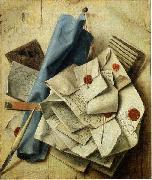 |
Cornelis Norbertus Gysbrechts
|
|
(ca 1630 - after 1683) was a Flemish painter of still life and trompe-l'œil active in the second half of the seventeenth century.
Gysbrechts was born in Antwerp, where, according to the RKD, he became a member of the Guild of St. Luke in 1660. He signed his name with "CND". His first known paintings date from 1659 in Antwerp. He painted in 1664 in Regensburg, from 1665-1668 in Hamburg and from 1668 to 1672 at the court in Copenhagen. |
|
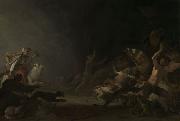 |
Cornelis Saftleven
|
|
(c. 1607, Gorinchem - 1 June 1681, Rotterdam) was a Dutch Golden Age painter
He was born into a family of artists, and learned to paint from his father Herman, along with his brothers Abraham and Herman Saftleven the Younger. He lived for a time in Utrecht with his brother.
Saftleven's subject matter covered various subjects, including genre works, portraits, beach scenes, and biblical and mythological themes. Some consider his images of Hell to be his most individual contribution to Dutch painting
|
|
|
|
|
|
|
|
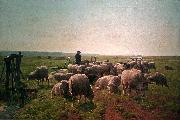 |
Cornelis Van Leemputten
|
|
(1841-1902) was a Belgian painter.
Born in Werchter, Cornelius van Leemputten is predominantly known for his landscapes with sheep, similar to the style of Charles Jacque. He began his painting career without formal training. He was well-known for his barnyard subjects. Leemputten eventually became a pupil of the Academy of Antwerp, though his style remained primarily self-taught.
Van Leemputten participated across several international exhibitions and received gold medals in Ghent in 1883, Edinburgh in 1886, Port Adelaide in 1887 and in Berlin in 1896. In 1895, he received the Knight of the Order of Leopold (Belgium).
|
|
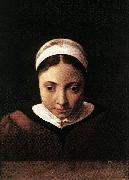 |
Cornelis van Poelenburch
|
|
(1594 - 12 August 1667) was a Dutch Golden Age landscape painter.
Though his birthplace is unknown, a signed document survives in Utrecht where he is listed as six years old and the son of Simon van Poelenburch, a Catholic canon in Utrecht.He initially trained with Abraham Bloemaert, and his earliest signed paintings are from 1620.He traveled to Rome where he was influenced by Adam Elsheimer and became a founding member of the Bentvueghels. He counted a few cardinals under his patrons, and was called to England by Charles I of England, for whom he made small cabinet pieces. He returned to Utrecht where he later died just a few years after his old teacher Abraham Bloemaert.He painted mostly small landcapes with mythical or religious figures or passages, in a style that would later be evident in some of the works of Claude Lorraine.
His "most important and successful" pupils were Daniël Vertangen, Dirck van der Lisse, François Verwilt, and Jan van Haensbergen. Arnold Houbraken claimed that his best pupil was Joan vander Lis from Breda (not Dirk vander Lis from The Hague). Houbraken then mentioned Vertangen, Verwilt, Warnard van Rysen from Bommel, and Willem van Steenree, a nephew. The RKD also mentions Laurens Barata. |
|
|
|
|
|
|
|
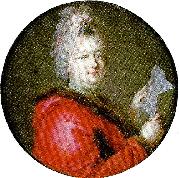 |
cornelius hoyer
|
|
Cornelius Höyer, född 1741, död 1804, var en dansk målare.
Höyer studerade dels i Köpenhamn, dels i Paris och Italien samt var redan 1769, då han återkom hem, en ansedd konstnär inom sitt fack, miniatyrmåleriet. 1770 blev han hovminiatyrmålare och medlem av konstakademien. Från 1777 var han dennas sekreterare.
|
|
|
|
|
|
|
|
|
|
|
|
|
|
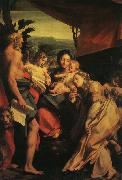 |
Correggio
|
|
Italian 1489-1534
Correggio Locations |
|
|
|
|
|
|
|
|
|
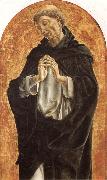 |
Cosme Tura
|
|
Italian Early Renaissance Painter, ca.1430-1495 |
|
|
|
|
|
|
|
|
|
|
|
|
|
|
|
|
|
|
|
|
|
|
|
|







